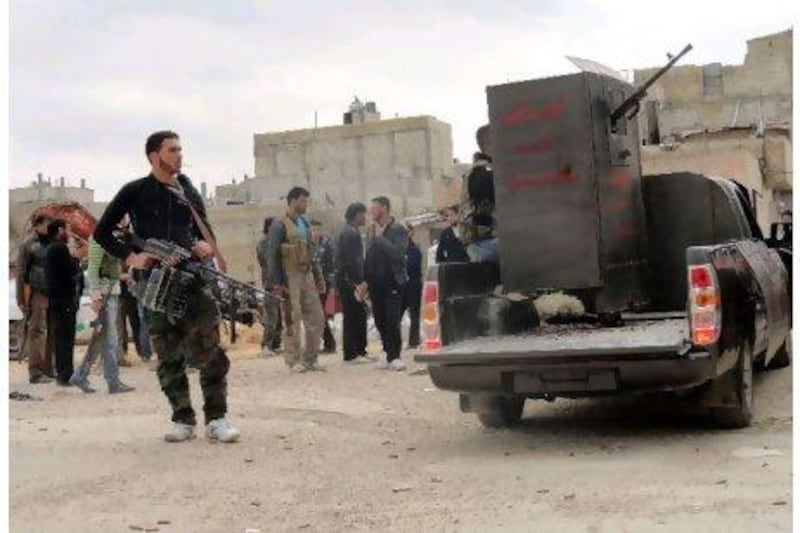The challenges hampering Syria's rebel army were laid bare when government troops drove them from an opposition stronghold in Homs: a shortage of sophisticated weaponry and a squabbling and divided political opposition.
The 4th Armoured Division, commanded by President Bashar Al Assad's younger brother, Maher, took less than 36 hours to seize control of Baba Amr after the neighbourhood was under siege for almost a month. Daily artillery bombardments turned the neighbourhood into a symbolic battleground for the uprising.
The Free Syrian Army (FSA), made up of former government soldiers and recruits, on Thursday called it a "tactical retreat". But what appeared more of a rout highlighted the rebels' dire lack of weapons and heightened the debate over whether external governments should try to supply them.
Colonel Riyad Al Assaad, commanding the 40,000 soldiers of the Free Syrian Army, announced his army's formation on July 29 based near the Turkish-Syrian border.
Soldiers once loyal to the president pledged to defend the protesters and united to topple the regime. But their cause has been plagued by a rift with the Syrian National Council (SNC), which is acting as an exiled opposition government, formed in August and based in Turkey.
The SNC leader, Burhan Ghalioun, said on Thursday that his group had formed a military body to oversee and organise armed rebels within the country under a unified leadership.
His announcement was met with disdain by the rebel army, which said it was kept in the dark about the decision and considered it another one of his failures to lead the war.
"This is betrayal. We are surprised on the formation of the military consultation council without informing us. How could such a decision be taken by the SNC without informing Col Riyad Al Assaad leading the military opposition," said Colonel Malek Al Kurdi, the deputy leader of the FSA.
The rebel army has previously criticised the SNC for failing to push the regime towards a transition process and, most importantly, for failing to provide it with much-needed weaponry to counter the regime's heavily armed forces.
"The SNC has failed us. We only buy our weapons from traitors in Assad's army who want to make some money before the regime falls," said Col Malek Al Kurdi, insisting no weapons have been provided to them from external parties.
"Soldiers who defect bring their personal weapons with them and whatever they can grab. Our FSA troops have conducted operations on several warehouses belonging to Assad's army and confiscated stockpiles of RPG's, machine guns, ammunition, and rifles," he said.
"Syrian merchants and loyal citizens unable to join the militant opposition have donated finances to sustain their hopes of a liberated Syria."
Col Al Kurdi said the price for a rifle is 70,000 Syrian pounds [Dh4,485], a machine gun costs 240,000 Syrian pounds, while a rocket-propelled grenade goes for 150,000 Syrian pounds.
Officers on the ground struggling against Mr Al Assad's army recounted the brief history of the FSA and warned of future splits and the threat of a Syria dominated by Islamist groups after the anticipated fall of the Al Assad "mafia" that has been running the country for decades.
Colonel Hussein Harmouch was one of the first officers to defect from the government army in May. He formed the Free Officers Movement, fled to Turkey and was later kidnapped and detained in Syria.
"The Syrian Muslim Brotherhood tried to penetrate, control, and finance the defected officers but their efforts were foiled," said Lieutenant Colonel Mohamed Hamado, a commander of at least 100 fighters in Ladkia who defected after 20 years in the Syrian army.
"The two groups were unified under one army, the FSA led by Col Riyad Al Assaad. Col Harmouch was supposed to be the official spokesman of the army before he was kidnapped."
The Syrian Human Rights League said last month that Col Harmouch was executed by a firing squad in Damascus by the Syrian Air Force intelligence. The government has not confirmed the execution.
As the civilian death toll increased, a power struggle within the FSA erupted with the defection of General Mustafa Al Sheikh, who established the Higher Military Revolutionary Council on February 5, according to Major Mahar Naimi, the official spokesman of the rival rebel group.
"The four colonels heading the FSA are managing the operation from a refugee camp at the Turkish-Syrian border, while we are fighting on the ground with light weapons everyday for a free Syria," said Lt Col Hamado, who pledged allegiance to Gen Al Sheikh.
Col Al Kurdi, the deputy leader of the FSA, insisted the rivalry is of no concern to him and will not affect their fight against the "killer Bashar".
"Gen Al Sheikh has no real followers except for some soldiers who defected from his hometown. Split we are, yet unified in our call for weapons because we cannot defeat Assad's helicopter gunships, rocket launchers, mortars, and tanks that he is using to erase Homs off the map," he said.
On February 12, the Arab League announced a draft resolution "giving a greenlight" for Arab nations to assist the opposition with financial aid and weapons.
Qatar responded by depositing US$50 million (Dh183.7m) in the account of the Syrian National Council according to Abdel Basit Sida and Khalid Kamal, senior members of the council.
"We will provide the FSA with everything from bread, satellite phones, medical supplies, and cash to buy weapons. A mechanism of spending the money has not been set in stone yet," Mr Kamal said.
Col Al Kurdi said he appreciated Qatar's generous donation and hoped other nations would follow suit.
The Syrian National Council may not have the support of all Syrians and the Free Syrian Army but they all share a goal of toppling the regime.
[ foreign.desk@thenational.ae ]
* With additional reporting by Reuters





